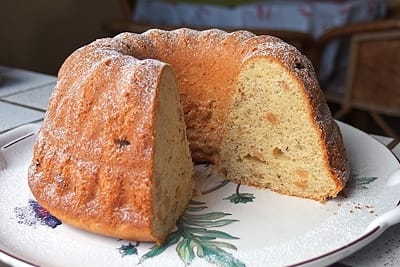Exquisite Kouglof Recipe
Gugelhupf or Kougelhopf

Kouglof
Gugelhupf in German, Kouglof in French or Kougelhopf in Alsatian, is a Central European speciality. There are as many recipes and variations as there are regions and family traditions. Here is my version which is a base, albeit good in itself, and easy to enrich. One important thing: the cake is prepared the day before and to be enjoyed the next day. The flavours will spread and it will be much better. This recipe is simple to make, rich in flavour and easy to adapt to your taste. I developed it with great care and many tests until I was completely satisfied. The cake is excellent and of superior quality. Guaranteed success among gourmets. Everything is detailed so that you can succeed on the first try.
Ingredients, about 12 servings:
- a 22 cm diameter Gugelhupf mould (or 2 cake moulds 24 cm long),
- 375 g wheat flour T65 type (with more taste),
- 220 g fermented milk (ribot, buttermilk, elben… or mix 1/3 of milk and 2/3 of yoghurt or cottage cheese),
- 150 g eggs (3 medium eggs),
- 150 g quality butter with taste, and soft,
- 80 g blond caster cane sugar to be ground into icing sugar (about 45 seconds in a blender/chopper),
- 40 g smooth liquid honey with a neutral taste,
- 18 to 20 g fresh yeast or 6 to 7 g of dry yeast (or the amount required for 375 g of flour),
- 125 g white dried raisins,
- 90 ml brown rum to soak and flambé the raisins,
- 40 g whole hazelnut powder (with the skin, more taste),
- 10 g sugar or 2 g (1/2 teaspoon) powdered vanilla or 5 ml liquid extract,
- 10 g vegetable oil neutral in taste.
Extra flavourings:
You can triple the vanilla with 6 g of powdered vanilla or 20 ml of liquid extract or 1 vanilla bean (if using vanilla sugar, subtract the equivalent of icing sugar), and/or double the powdered hazelnut, and/or double the raisins, or add 15-30 ml (1-2 tablespoons) of kirsch. You can add almonds or pistachios in small chunks, or better yet, coat these seeds with caramel (like when making praline) and break them into small bits. Finally, you can draw inspiration from my muffin recipe by adding 20% more flavouring ingredients.Course of the recipe:
All ingredients are at room temperature (butter, eggs, fermented milk…).
Place the raisins in a small saucepan, cover them level with rum, close with a lid and warm them over very low heat (about 40°) for 30 minutes. Once soaked, heat them over medium-high heat until they are very hot, stirring constantly. Remove the pan from the heat and ignite the hot rum with a lighter. Shake the pan and stir with a spoon until the flame goes out. Dissolve the yeast in the fermented milk. In a bowl, whisk the eggs for 30 seconds to 1 minute. In a large bowl, cream the butter by whisking with an electric whisk at medium to high speed for about 3 minutes. Add the honey and sugar and whisk for 30 seconds. Pour in the oil and mix for about 2 minutes at medium speed, then add all the other ingredients at once (flour, fermented milk with dissolved yeast, eggs, hazelnuts and vanilla) and mix at low speed for a maximum of 2 minutes (not longer, do not overwork the dough). Add the raisins (and other seeds or flavours) just to incorporate them into the dough. Grease the tin and pour the dough into the tin, cover it with plastic wrap or a damp cloth and leave to leaven for about 1 hour at room temperature. The dough should puff up.
Baking:
Preheat the oven to 160°. Bake at 160° for 40 to 45 minutes on a fan-assisted oven or 45 to 55 minutes in convection mode. Insert a pin in the centre of the cake, if it comes out with a few crumbs, it is cooked, if it comes out dry, it is overcooked. Take the pan out of the oven, stand 10 minutes out of the oven, then unmould and allow to cool down on a wire rack. After 1 to 2 hours, wrap the cake in plastic film, place it in a cool place (cellar or refrigerator) and serve the next day.
Before serving, sprinkle very lightly with icing sugar for decoration. The cake will keep for 3 days in the refrigerator in an airtight box or wrapped in plastic film to prevent it from drying out.
“If-” you'll be a Man…
Re-discover Rudyard Kipling's famous poem “If- you'll be a Man, my son” which has inspired so many generations. It celebrates the courage to overcome hardship.
I've decided to succeed
I have put together 10 tried and tested tips for finding the will to successfully achieve your ambitions and overcome obstacles in your personal and professional life.
Gourmet treats
Exquisite recipes for mini-cakes (madeleines, financiers, biscuits, cakes, muffins) and other delicacies (croissants, brioche, traditional cakes…).